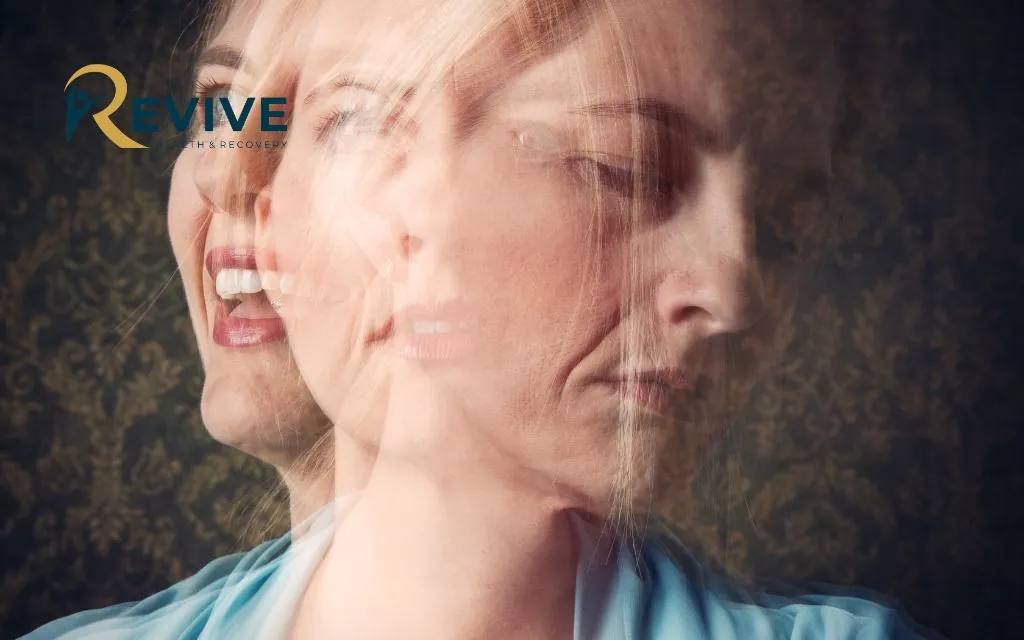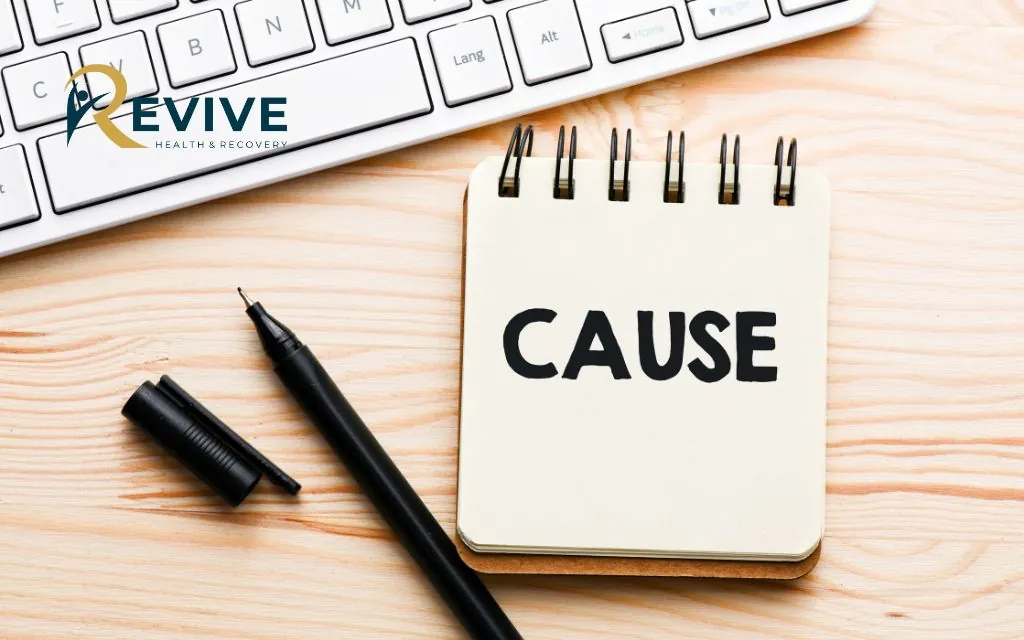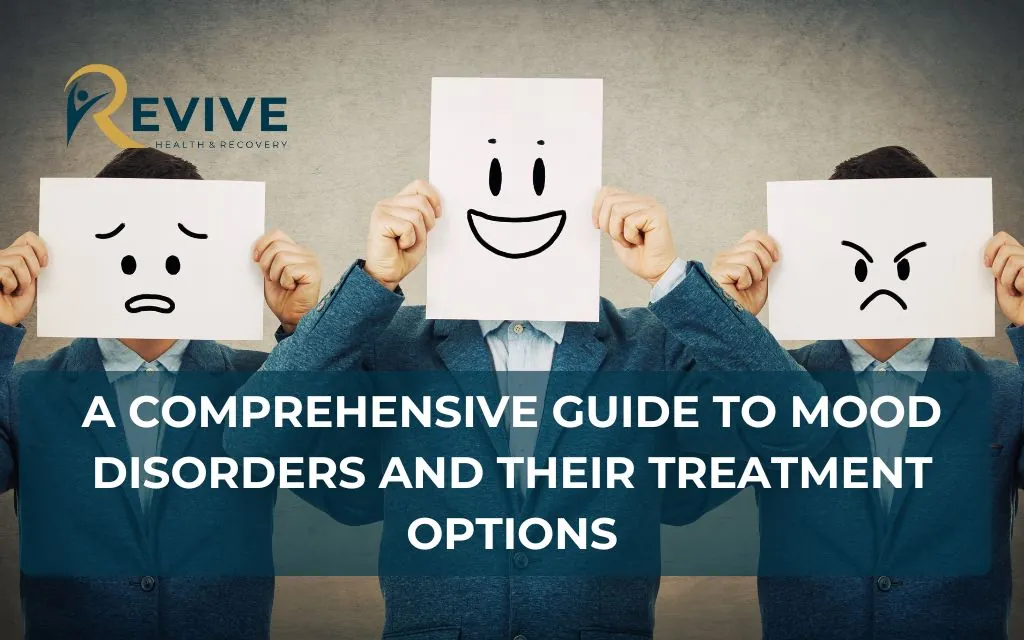Mood disorders affect millions of Americans, with Colorado experiencing some of the highest rates in the nation. From the seasonal challenges of Denver’s winters to the unique stressors of mountain living, Coloradans face distinct mental health challenges. Whether you’re experiencing persistent sadness, extreme mood swings, or emotional instability, understanding mood disorders is the first step toward recovery.
At Revive Health Recovery in Denver, we specialize in evidence-based outpatient treatment for depression, bipolar disorder, and other mood conditions. Our comprehensive approach combines cutting-edge therapies with compassionate care, helping individuals throughout Colorado regain emotional balance and improve their quality of life. This guide explores everything you need to know about mood disorders, from symptoms and causes to the most effective treatment options available right here in Denver.
What are Mood Disorders and Why They Matter in Colorado
Mood disorders represent complex mental health conditions that significantly disrupt a person’s emotional state, affecting millions of adults nationwide. These conditions go far beyond typical sadness or temporary emotional fluctuations. In Colorado, where we rank 50th nationally for mental health prevalence, understanding mood disorders becomes particularly crucial for our community’s wellbeing.
At Revive Health Recovery, we’ve witnessed firsthand how mood disorders impact families throughout the Denver metro area. These conditions involve persistent changes in mood, energy, and behavior that interfere with daily functioning, relationships, and overall quality of life.
Colorado’s unique environmental factors create additional challenges. Our state’s high altitude can reduce oxygen levels, potentially affecting brain chemistry and contributing to increased depression rates. The dramatic seasonal light changes also trigger Seasonal Affective Disorder in approximately 5% of adults annually, making specialized Colorado-focused treatment essential.
Types of Mood Disorders: Recognizing the Spectrum
Major Depressive Disorder (MDD)
Major depressive disorder affects millions of Americans, causing persistent feelings of sadness, hopelessness, and loss of interest in previously enjoyed activities. This condition extends beyond temporary blues, involving neurochemical imbalances that require professional intervention.
Symptoms typically include sleep disturbances, appetite changes, fatigue, difficulty concentrating, and feelings of worthlessness. The DSM-5 requires symptoms to persist for at least two weeks and significantly impair functioning for diagnosis.
Bipolar Disorder
Bipolar disorder involves alternating episodes of depression and mania or hypomania. During manic episodes, individuals experience elevated mood, increased energy, reduced need for sleep, and sometimes poor judgment. These episodes contrast sharply with depressive periods.
Research indicates that up to 20% of women screened for postpartum depression may actually have bipolar disorder, highlighting the importance of accurate diagnosis and specialized treatment.
Persistent Depressive Disorder (Dysthymia)
This chronic form of depression involves less severe but longer-lasting symptoms than major depression. Individuals may function daily but experience persistent low mood, low energy, and diminished enjoyment of life for years.
Seasonal Affective Disorder (SAD)
Particularly relevant in Colorado, SAD involves depression that occurs during specific seasons, typically winter. Our state’s significant seasonal light changes make this condition especially common among Colorado residents.
Cyclothymic Disorder
This condition involves chronic fluctuations between hypomania and mild depression, creating ongoing emotional instability without meeting full criteria for bipolar disorder.

Recognizing Mood Disorder Symptoms
Depressive Episodes
Depressive symptoms manifest differently across individuals but commonly include persistent sadness, emptiness, or irritability lasting most of the day. Physical symptoms involve changes in appetite or weight, sleep disturbances ranging from insomnia to excessive sleeping, and fatigue or loss of energy.
Cognitive symptoms include difficulty concentrating, making decisions, or remembering information. Emotional symptoms encompass feelings of worthlessness, excessive guilt, and recurrent thoughts of death or suicide. Behavioral changes involve withdrawal from social activities, decreased productivity, and neglecting personal care.
Manic and Hypomanic Episodes
Manic episodes involve distinct periods of elevated, expansive, or irritable mood lasting at least one week. Symptoms include decreased need for sleep, increased talkativeness, racing thoughts, distractibility, and increased goal-directed activity or psychomotor agitation.
Hypomania presents similar symptoms but with shorter duration and less severe impairment. These episodes may initially feel positive but can lead to poor judgment and risky behaviors.
Physical and Emotional Indicators
Physical manifestations include unexplained aches and pains, headaches, digestive issues, and changes in motor activity. Emotional indicators encompass mood swings, emotional numbness, heightened sensitivity, and difficulty regulating emotions.
Social indicators involve relationship difficulties, isolation, work or school performance changes, and loss of interest in previously meaningful activities.
Understanding the Root Causes
Biological Factors
Mood disorders stem from complex interactions between genetic predisposition and neurochemical imbalances. Neurotransmitters like serotonin, dopamine, and norepinephrine play crucial roles in mood regulation. When these chemical messengers become imbalanced, mood disorders can develop.
Brain structure and function differences also contribute to mood disorders. Neuroimaging studies reveal variations in areas responsible for emotional processing and regulation.
Environmental Triggers
Life experiences significantly influence mood disorder development. Traumatic events, chronic stress, major life changes, and ongoing relationship difficulties can trigger episodes in vulnerable individuals.
Colorado’s environmental factors add unique considerations. High altitude affects oxygen levels, potentially impacting brain function. Seasonal light changes influence circadian rhythms and melatonin production, contributing to seasonal depression.
Psychological Contributors
Thought patterns and coping mechanisms influence mood disorder development. Negative thinking patterns, perfectionism, and poor stress management skills can contribute to symptom severity.
Family dynamics, early childhood experiences, and learned behavioral patterns also play significant roles in mood disorder development and maintenance.

Evidence-Based Treatment Approaches
Cognitive Behavioral Therapy (CBT)
CBT represents one of the most effective therapeutic approaches for mood disorders, showing 60-80% effectiveness rates. This evidence-based therapy helps individuals identify and modify negative thought patterns and behaviors contributing to mood symptoms.
During CBT sessions, clients learn to recognize cognitive distortions, challenge unhelpful thoughts, and develop healthier coping strategies. The therapy focuses on present-moment challenges while building skills for long-term emotional regulation.
Dialectical Behavior Therapy (DBT)
Originally developed for borderline personality disorder, DBT demonstrates remarkable 60-80% effectiveness for mood disorders. This comprehensive approach combines individual therapy, group skills training, and crisis coaching.
DBT teaches four core modules: mindfulness, emotional regulation, distress tolerance, and interpersonal effectiveness. These skills help individuals manage intense emotions and develop healthier relationships.
Interpersonal Therapy (IPT)
IPT focuses on improving interpersonal relationships and social functioning to relieve symptoms. This approach addresses grief, role disputes, role transitions, and interpersonal skill deficits that contribute to mood episodes.
Medication Management
Psychiatric evaluation and medication management play crucial roles in comprehensive treatment. Mood stabilizers like lithium and valproic acid help regulate mood fluctuations in bipolar disorder. Antidepressants address neurotransmitter imbalances in depressive conditions.
Our team works closely with psychiatrists to monitor medication effectiveness and adjust treatment plans based on individual responses and side effects.

Comprehensive Coping Strategies
Mood Tracking Techniques
Recognizing patterns and triggers helps individuals gain insight into their condition. Daily mood tracking identifies early warning signs, environmental factors, and treatment effectiveness.
Sleep Hygiene
Establishing consistent sleep routines supports mood stability. Regular sleep schedules, comfortable sleep environments, and avoiding stimulants before bedtime promote better emotional regulation.
Stress Management
Mindfulness practices, relaxation techniques, and breathing exercises help manage daily stress. These skills prove particularly valuable during difficult periods or crisis situations.
Social Support
Building and maintaining relationships provides essential emotional support. Family therapy and group programs help strengthen social connections and communication skills.
Activity Scheduling
Balancing stimulation and rest prevents overwhelming periods while maintaining engagement in meaningful activities. Structured routines provide stability and predictability.

Lifestyle Modifications for Colorado Residents
Regular Exercise
Colorado’s outdoor opportunities provide excellent exercise options that benefit mood disorders. Physical activity increases endorphin production, improves sleep quality, and reduces stress hormones.
Nutrition
Anti-inflammatory diets rich in omega-3 fatty acids support brain health and mood stability. Avoiding processed foods and maintaining stable blood sugar levels helps regulate emotions.
Light Exposure
Managing seasonal changes becomes particularly important in Colorado. Light therapy during winter months helps regulate circadian rhythms and combat seasonal depression.
Substance Avoidance
Alcohol and drugs significantly impact mood and interfere with treatment effectiveness. Avoiding these substances supports recovery and emotional stability.
Routine Development
Structure and predictability help manage mood disorder symptoms. Consistent daily routines provide stability during challenging periods.
Relapse Prevention Strategies
Early Warning Signs
Recognizing mood changes before they become severe allows for prompt intervention. Common warning signs include sleep disruption, appetite changes, social withdrawal, and cognitive difficulties.
Crisis Planning
Emergency contacts and strategies provide safety nets during crisis situations. Having clear plans reduces anxiety and ensures appropriate support when needed.
Medication Compliance
Working with healthcare providers to maintain consistent medication regimens prevents relapse and maintains stability. Regular monitoring ensures optimal treatment effectiveness.
Ongoing Therapy
Maintenance and booster sessions help individuals maintain progress and address new challenges. Continued therapy support prevents symptom return and builds resilience.

FAQs about Mood Disorders
How do I know if I have a mood disorder or just normal sadness?
Normal sadness typically relates to specific events and improves with time. Mood disorders involve persistent symptoms lasting at least two weeks for depression or distinct periods of mania/hypomania for bipolar disorder, significantly impacting daily functioning. Revive Health Recovery offers comprehensive assessments to determine if professional treatment would benefit you.
Can mood disorders be cured, or is treatment lifelong?
While mood disorders are typically chronic conditions, they are highly treatable. Many people achieve full symptom remission and lead normal, productive lives with proper treatment. Some may need ongoing maintenance therapy, while others may have periods of wellness without active treatment. Our team at Revive Health Recovery develops personalized long-term care plans for sustained recovery.
How does Colorado’s climate affect mood disorders?
Colorado’s high altitude can impact brain chemistry and oxygen levels, potentially affecting mood. Additionally, significant seasonal light changes can trigger Seasonal Affective Disorder (SAD) in susceptible individuals, making light therapy and seasonal preparation important. Revive Health Recovery specializes in Colorado-specific mood disorder treatment considerations.
What’s the difference between outpatient and inpatient treatment for mood disorders?
Outpatient treatment allows individuals to maintain daily responsibilities while receiving intensive therapy and support. Inpatient treatment is reserved for severe cases involving safety risks. Revive Health Recovery specializes in comprehensive outpatient care that provides intensive support while maintaining life flexibility.
How long does treatment for mood disorders typically take?
Treatment duration varies based on individual factors, but most people see improvement within 6-12 weeks of starting treatment. Initial intensive phases may last 3-6 months, followed by maintenance therapy. Many individuals benefit from ongoing periodic check-ins to maintain wellness. Contact Revive Health Recovery to discuss your specific treatment timeline.
Why Choose Revive Health Recovery for Mood Disorder Treatment
Specialized Colorado Expertise
Our team understands Colorado-specific factors affecting mood disorders, including altitude effects and seasonal changes. We maintain strong local community connections and resources to support comprehensive care.
Experience with Denver metro area demographics helps us tailor treatment approaches to our community’s unique needs.
Comprehensive Outpatient Programs
Intensive Outpatient Programs (IOP) provide structured daily treatment while allowing individuals to maintain work and family responsibilities. Our flexible scheduling accommodates diverse lifestyle needs.
Individual Therapy offers personalized treatment plans addressing specific symptoms, history, and recovery goals. Each client receives customized care based on their unique circumstances.
Group Therapy provides peer support and shared experiences that reduce isolation and build community connections. Learning from others facing similar challenges offers hope and practical strategies.
Family Therapy includes loved ones in the recovery process, strengthening relationships and improving communication patterns. Family involvement significantly improves treatment outcomes.
Medication Management involves psychiatric evaluation and ongoing monitoring to optimize treatment effectiveness while minimizing side effects.
Evidence-Based Treatment Philosophy
We utilize proven therapeutic modalities including CBT, DBT, and trauma-informed care approaches. Our Colorado holistic treatment considers mind, body, and spirit for comprehensive healing.
Continuous outcome measurement and treatment adjustment ensure optimal progress and sustained recovery.
Convenient Denver Location
Our accessible location at 1427 S Federal Blvd provides easy access for Denver metro area residents. Flexible scheduling accommodates working professionals and family obligations.
Telehealth options offer additional convenience when appropriate, while 24/7 crisis support availability ensures help when needed most.
Insurance and Accessibility
We accept multiple insurance plans and offer sliding scale options for financial accessibility. No waitlists exist for urgent cases, ensuring prompt treatment when needed.
Cultural competency and diverse staff provide inclusive care for all community members.
Conclusion
Don’t let mood disorders control your life any longer. Whether you’re struggling with depression, bipolar disorder, or other mood-related challenges, professional help is available right here in Denver. At Revive Health Recovery, we’ve helped hundreds of Coloradans reclaim their emotional well-being through evidence-based, compassionate care.
Our expert team is ready to create a personalized treatment plan that fits your life and goals. Located conveniently at 1427 S Federal Blvd, Denver, CO 80219, we’re easily accessible throughout the metro area.
Take action today:
- Call us at (303) 268-4655 – Available 24/7 for immediate support
- Email us at contact@revivehealthrecovery.com for more information
- Visit our website to learn more about our programs and schedule a consultation
Your journey toward emotional wellness starts with a single call. Contact Revive Health Recovery today and discover how we can help you build a brighter, more balanced future.
This comprehensive content strategy provides approximately 3,500-4,000 words when fully developed, incorporates all target keywords naturally, addresses the specific needs of Colorado residents, and positions Revive Health Recovery as the premier local solution for mood disorder treatment.



